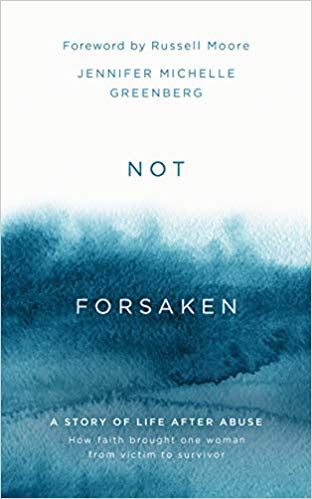6 Things to Never Say to a Sexual Abuse Victim

Most young wives want advice on how to make a marriage last, or maybe how to communicate with an ex-bachelor who only seems to speak football.
But at 21 years of age, all I wanted was for someone to listen.
I am a survivor of over two decades of child abuse, domestic violence, emotional abuse, and sexual abuse. It wasn’t until early in my marriage to a loving man that I began to share my story. Suddenly, I was safe. Suddenly, I could speak.
All I wanted was compassion, sympathy, and help getting help. I didn’t expect my friends, neighbors, or even the average churchgoer to have the calm wisdom of a seasoned counselor, nor the experience of a therapist.
Unfortunately, I found that people don’t know what to say to a sexual abuse victim. And most people, when they don’t know what to say, blurt out the first thing that comes to mind.
Here are a few of the most hurtful responses I’ve heard, and some alternatives to consider:
1. “You need to forgive your abuser.”
On the surface, this sounds logical and biblical, but let’s unpack the phrase. The dictionary definition for “forgive” includes meanings like, “give up claim to amends,” and “release from payment of debt.”
It’s important to avoid implying to a victim that they don’t deserve amends, justice, or shouldn’t file a police report. We also don’t want to turn forgiveness into chore, or gloss over the abuser’s probable lack of repentance.
Forgiveness is a blessing from God, and a process that may take time and healing before it’s genuinely felt, possible, or safe.
An alternative thing to say might be to say, “I’ll pray God comforts you and gives you peace.”
2. “What were you wearing?”
Always avoid insulting the victim’s intelligence, modesty, or decisions. Even in the case that they have made unwise choices, what they desperately need is for you to make the wise choice to get them help.
I remember when I was about 15 years old, sitting on the couch next to my abusive dad and watching the news. An interviewee told the reporter, “I don’t care if a woman cartwheels through Central Park naked at 3AM, she doesn’t deserve to get raped.” That concept marked a huge milestone for me as I grappled with the reality that my dad was a sexual predator. Because no matter how modestly I dressed, no matter how well I behaved, or how scarce I tried to make myself, he kept harassing and abusing me.
That interviewee on the news that night, all those years ago, helped me realize that my abuser’s sin was not my fault. His guilt was 100% his own.
3. “If you had stronger faith, God wouldn’t have let this happen to you.”
When we think about people in the Bible – David, Daniel, Joseph, Paul – do we think about how peaceful and pleasant their lives were? Of course not.
Saul violently persecuted David and tried to kill him.
Daniel was thrown into a lion’s den.
Joseph was beaten up and sold into slavery by his own brothers.
Paul was beaten, whipped, falsely imprisoned, and martyred.
The Son of God was hung on a cross.
The greatest men of the Bible – the spiritual giants with faith like whole mountain ranges – were abused.
A loving thing to tell an abuse survivor might be, “Your story reminds me of Job’s, because no matter how bad things got, God kept you going. He must really love you.”
4. “God helps those who help themselves.”
So often we are helpless, beaten down, and brokenhearted. Like the battered and robbed man lying on the road to Jericho (Luke 10:25-37), we need a Good Samaritan to come along, pick us up, tend our wounds, and keep us safe.
Everywhere we look in the Bible, we see God helping people who cannot help themselves. He rescued the slave, Hagar, and her newborn boy, as they wandered in the wilderness, fleeing abuse and ready to die (Genesis 21).
He freed the Israelites from slavery in Egypt, even after they rejected his help (Exodus 3-14). He sent his Son to pay our ransom on the cross, and free us from our slavery to sin and death (John 8:34-36). God helps. And we should help too.
I’d suggest saying, “God helps,” and just stop right there.
5. “Leave the past in the past.”
Imagine crawling out of a terrible car accident. You have broken bones, possibly a concussion, and cuts all over you. You need help, fast. A friend walks by, and you desperately call out to them. But instead of helping you, they say, “Stop complaining. Stop obsessing over your pain. Forget about it. Leave the past in the past.”
Your relief at seeing them quickly turns to horror, as you realize they won’t give you the help you need.
This is how abuse victims often feel when they’re told to forget their experiences and move on. If only we could see spiritual wounds. If only we could document emotional injuries and spiritual lacerations. Then perhaps, rather than, “Put it behind you,” more people would say, “Let’s get you the help you need.”
6. “Repent of your depression and anxiety.”
Sometimes, depression and anxiety are chemical imbalances. In this case, calling someone to repent makes about as much sense as calling a diabetic to repent of their insulin imbalance. Other times, we’re depressed because depressing things have happened. Maybe we’re anxious because we’ve grown accustomed to betrayal, disappointment, and everything going terribly wrong. We can’t relax because we’re so used to expecting erratic and abusive behavior from others.
But we’d never tell someone whose loved one has died that they should repent of mourning.
Just so, we shouldn’t tell someone whose relationship with a loved one has died that they must cease grieving.
Jesus wept. Jesus anxiously sweated blood in Gethsemane. Jesus got lonely and angry and sad. While refusal to trust God is sin, one can be depressed or anxious yet have the faith of a Psalmist. In fact, the Psalmists often expressed sorrow and fear while clinging to God.
To paraphrase C.S. Lewis, sometimes we worry – not because we lack faith in God’s plan – but because we don’t know how difficult God’s plan will turn out to be. Rather than shame the grieving, we are called to “… mourn with those who mourn.” Romans 12:15b
Be the Good Samaritan
As Christians, we point people to Jesus. Like everyone else, sexual abuse victims need to be reminded that Jesus loves them. There are two ways to go about this; you can tell them, and you can show them.
Remember the parable of The Good Samaritan, which Jesus told in Luke 10? Not only did the Samaritan pick up the victim and get him out of danger to safety, but he found him shelter and medical care. He took him to an inn, gave the inn-keeper some money, and asked him to feed and clothe the victim, and tend to his injuries.
The Samaritan didn’t do everything all by himself. He involved others. He didn’t have any wise advice or profound prayers that we’re told about. He simply did what he could and was kind.
Sometimes we need to involve law enforcement – not only because we want to protect the victim – but because God loves justice, and we love God. We involve counselors, pastors, and therapists – not only to help the victim heal – but because God loves wisdom, compassion, mercy, and binding up the brokenhearted.
You won’t always have the right words, and that’s OK. Sometimes, being the hands and feet of Jesus is more immediately needed in a crisis situation. When God places you in a position to help an abuse victim, your primary goal is to show them the love of Jesus and his passion for righteousness.

Photo Credit: ©GettyImages/Milkos
Originally published August 20, 2019.





